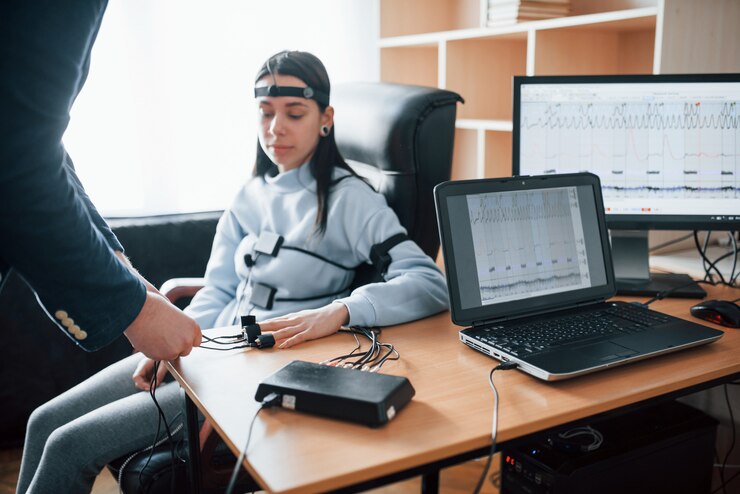Introduction: The Appeal of Affordable Truth-Seeking Tools
In today’s world, where truth is often hard to come by, lie detector tests—also known as polygraph tests—have found a steady spot in popular culture and real-world investigations. From courtroom dramas to reality TV, the concept of using a machine to detect deception has intrigued millions. While professional polygraph tests conducted by certified examiners can be costly, a growing number of people are turning toward cheaper alternatives that claim to offer similar benefits. Whether it’s an employer trying to screen a candidate, a couple trying to resolve trust issues, or even friends resolving disputes, the appeal of a cheap lie detector test is undeniable. But is saving money worth the potential risks and limitations of a low-cost truth-checking method? This article dives deep into the subject, exploring what cheap lie detector tests offer, how they work, their reliability, legal standing, and when—if ever—they might be a viable option.
Understanding How Lie Detector Tests Work
To understand the implications of a cheap lie detector test, it’s essential first to grasp how a standard polygraph test functions. A polygraph doesn’t actually detect lies. Instead, it measures physiological responses—such as heart rate, blood pressure, respiration, and skin conductivity—that are believed to change when a person is being deceptive. These readings are then interpreted by a trained examiner who compares baseline responses to answers given during a series of questions.
Polygraph tests are typically divided into three parts: the pre-test interview, the actual test, and the post-test phase. In the pre-test interview, the examiner discusses the questions with the subject to ensure clarity and establish a baseline for physiological responses. The examiner presents relevant and control questions during the test while monitoring the individual’s bodily responses. Lastly, in the post-test phase, results are analyzed and conclusions are drawn.
A professional lie detector test can range from $200 to over $2,000, depending on the location, examiner’s credentials, and the case’s complexity. This cost structure often prompts individuals to look for cheaper alternatives.
The Rise of Cheap Lie Detector Tests
With technological advances and growing demand, the market has responded by offering various budget-friendly lie detection solutions. These range from app-based lie detectors to basic home-use polygraph kits and even low-cost services by lesser-known examiners. Some options are priced as low as $20 for a downloadable app or around $100–$150 for a quick in-person test by a lesser-experienced operator.
Cheap lie detector test options typically fall into three main categories:
Mobile Apps and Online Software
These rely on voice stress analysis (VSA), facial recognition, or simple algorithms that gauge stress levels based on vocal tone or facial expressions. While attractive due to low cost and accessibility, the science behind these tools is often questionable and lacks the backing of robust peer-reviewed research.
Do-It-Yourself Polygraph Kits
These kits may include basic sensors to measure pulse and sweat, but are far less sophisticated than professional equipment. Most also lack expert interpretation, a critical part of the process.
Low-Cost Professional Services
In some cases, individuals offer polygraph services at a much lower rate than standard. These may include students in training or professionals operating without accreditation. While they may use the same equipment, the lack of experience can severely impact the accuracy and credibility of the results.
Pros and Cons of Cheap Lie Detector Tests
As with any cost-cutting decision, opting for a cheap lie detector test has upsides and downsides. While some may argue that “something is better than nothing,” when it comes to detecting lies and making decisions based on results, the margin of error can have serious consequences.
Pros:
Affordability: The most apparent benefit is the reduced cost. A person who cannot afford a $500 test might find a $100 version more accessible.
Quick Access: Many cheap tests are available online or at short notice, allowing users to address urgent concerns promptly.
Non-legal Situations: A budget polygraph might serve as a conversation starter or emotional icebreaker for personal disputes or informal situations where legal accuracy isn’t required.
Cons:
Questionable Accuracy: Cheaper tests often rely on oversimplified methodologies or unvalidated technology, reducing the reliability of the results.
Lack of Legal Standing: In most jurisdictions, even professional polygraph results are not admissible in court. A cheap test is even less likely to carry any legal weight.
Potential Harm to Relationships: Relying on an inaccurate result can further strain relationships, leading to misplaced trust or false accusations.
No Regulatory Oversight: Low-cost providers may not follow industry standards, opening the door to biased, unethical, or fraudulent practices.
Legal and Ethical Considerations
It’s crucial to understand that the use of polygraph tests, cheap or otherwise, comes with legal and ethical implications. In the United States, the Employee Polygraph Protection Act (EPPA) restricts most private employers from using lie detector tests during hiring or employment. Some exceptions exist—such as in security firms or government agencies—but the tests must meet specific legal standards even then.
If you choose to use a cheap lie detector test in personal matters, you should still obtain consent from the person being tested. Coercing someone into taking a polygraph, especially one that lacks scientific credibility, can be considered unethical and potentially illegal in some regions.
Moreover, false positives and negatives can have lasting consequences. A person wrongly labeled as deceptive might face social stigma, job loss, or emotional trauma. Conversely, a guilty individual who passes a flawed test might be unjustly trusted.
How Reliable Are Budget Polygraph Alternatives?
Reliability is the cornerstone of any lie detection tool, and this is where cheap lie detector tests often fall short. While professional polygraph tests claim accuracy rates of 70–90%—though these figures are disputed—even those figures aren’t high enough to guarantee justice or truth. The accuracy of cheaper tests tends to drop significantly, mainly when relying on voice stress analysis or DIY kits without proper calibration and expert interpretation.
Voice stress analysis, often used in mobile apps, has shown mixed results in research studies. Some studies suggest it’s barely more effective than chance, while others show a slight improvement over random guessing. Unfortunately, the inconsistency of these methods makes them unreliable for high-stakes scenarios.
DIY polygraph kits might provide fun or insight into how lie detectors function, but users can easily misinterpret results without formal training. Even subtle body movements, nervousness, or external factors like caffeine or medication can influence readings, leading to erroneous conclusions.
When Might a Cheap Lie Detector Test Be Useful?
Despite their flaws, cheap lie detector tests aren’t entirely without value. There are scenarios where they may serve as valuable tools—though always with caution and understanding of their limitations.
- Educational Purposes: Learning how lie detectors work can interest students, hobbyists, or anyone fascinated by human behavior and psychology.
- Icebreakers in Counseling or Mediation: A low-stakes test may be a starting point for discussions on trust and honesty in specific therapy settings.
- Personal Curiosity: If both parties consent and understand the results are not definitive, a budget lie detector can be a harmless way to explore interpersonal dynamics.
Still, these should never replace professional counseling, legal investigations, or scientific fact-finding. When using such tools, always prioritize ethical practices, consent, and emotional well-being.
Alternatives to Lie Detector Tests
If you’re considering a lie detector test—cheap or otherwise—ask yourself what you’re trying to achieve. In many cases, there are better, more accurate ways to uncover the truth or resolve conflicts.
- Open Communication: Honest conversations often do more to build trust than any device.
- Counseling or Mediation: A licensed professional can help resolve interpersonal issues in a safe, neutral environment.
- Background Checks: In professional settings, background investigations and reference checks may be more effective and legally sound.
- Behavioral Analysis: Professionals trained in microexpressions and behavioral cues may offer non-invasive alternatives to polygraph testing.
Conclusion: Think Twice Before Relying on Cheap Lie Detector Tests
The quest for truth is noble, but the tools we use must match the gravity of the task. While a cheap lie detector test might seem like an accessible solution to uncover deception, it’s rarely the foolproof method many hope to be. From technical limitations and questionable accuracy to ethical concerns and legal risks, the drawbacks often outweigh the benefits—especially when trust, relationships, or reputations are on the line.
That said, with informed consent, realistic expectations, and a clear understanding of the limitations, budget-friendly lie detection tools may have a place in low-risk, informal scenarios. Just don’t mistake affordability for reliability. Invest in more reliable, ethical, and evidence-based alternatives when the truth matters.




